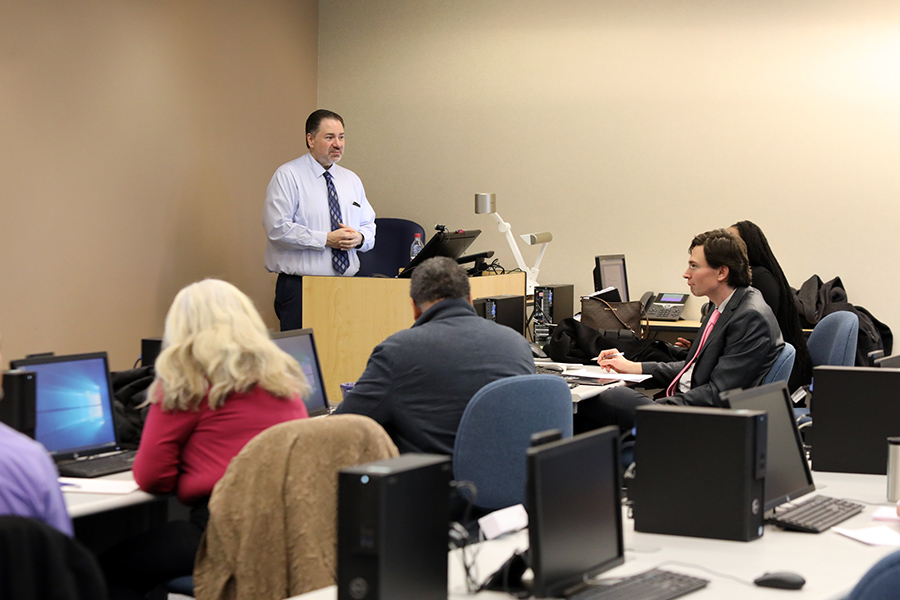- Apply
- Visit
- Request Info
- Give
Open Education Resources: Alternative Learning Sources for Students
Written by Dwight Bachman
Published on February 13, 2020

The movement to help Eastern students find more economical ways to access learning subject matter picked up momentum on Feb. 11 when Kevin Corcoran, executive director of digital learning for the CSCU system, provided an update on Open Educational Resources (OER) in a workshop in the Center for Instructional Technology in the J. Eugene Smith Library.
Corcoran provided information on new state legislation, while Eastern faculty members Kim Ward, associate professor of mathematics, and Nicolas Simon, professor of sociology, shared their experience using OER in their classrooms. Reference and Instruction Librarian Angela Walker guided the audience through the library’s OER Guide, to help participants navigate OER repositories for educational resources.
Corcoran said in the past 30 years, the costs of textbooks has risen more than 800 percent, more than three times the cost of medical care, home prices and the rate of inflation. According to the U.S. Public Interest Research Group (PIRG), in the past decade alone, the price of college textbooks has soared, increasing by 73 percent — four times the rate of inflation. The PIRG report says 1 in 3 students—30 percent of students—used financial aid to pay for their textbooks, using more than $300 a semester to pay for books.
“The financial impact of textbooks is significant,” said Corcoran. “Students may end up withdrawing from class due to the cost of their textbooks; take fewer courses; earn a poor grade by not even purchasing the required textbook, or even switch majors because of the price of the required textbooks!”
Corcoran said OER allows professors to tap into alternative resources. “OER are teaching, learning and research materials that reside in the public domain or have been released under an intellectual property license that permits their free use and re-purposing by others. These includes full courses, course materials, modules, textbooks, streaming videos, tests, software or techniques used to support access to knowledge.”
Corcoran said accessible OER materials make higher education more affordable; makes learning and teaching more collaborative; expands opportunities for interdisciplinary instruction; ensures that student have the tailored resources they need to learn; and promotes academic freedom.
Corcoran said new legislation — Public Act 19-117, Section 147 — is helping to enhance OER. The bill has made more than $90,000 available in grant opportunities through Connecticut’s Office of Higher Education. Faculty can apply for grants ranging from $500 up to $1,000 along with collaborative efforts with up to $25,000 available, depending on the level, intent and impact of a course. April 13 is the closing date to apply. An Eastern student sits on the statewide OER program committee!
Ward and Simon both expressed thanks for being named past OER grant winners. Ward, who began exploring OER in 2008 as coordinator of the Math Foundations Program at Eastern, says the high cost of math textbooks coupled with the speed which math is taught is a “recipe for failure.” She demonstrated how she had employed OER strategy and materials in several of her classes. “This is important to me. I may not be able to reduce tuition but using and promoting the use of EOR has provided students with much needed financial relief.”
Simon said, “Students of today are different than the students of yesterday. In my classes, I have students download articles and create PowerPoints that can be used as resources for themselves and other faculty members in the CSCU system, which can help to relieve their students from financial constraints as well.”
Maya Vanderberg, a first-year student in Eastern’s Honor Program, participated in creating supplemental material for Simon’s Introduction to Sociology, 2nd Edition. “I took the course because it was a requirement of my major, though finding out over the summer that access to the digital textbook for the course was free was certainly an added bonus.”
Walker said her team in the library, including the staff in the Center for Instructional Technology, offers collaborative library service to support faculty adopt and implement OER strategies, including licensing and implementation. “CSCU librarians from across the system, experienced with OER, will provide virtual coverage Monday through Friday from 9 a.m. to 5 p.m. Assistance is available right from the website, which contains information for campus OER leaders, as well as discipline-specific faculty OER adopters who are willing to assist. So, join our Eastern OER Network for collaboration on campus to make higher education more affordable and engaging for our students!”


